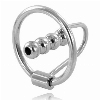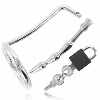No products
What is Sounding and How to Practice
Published : 2025-10-03 11:01:50
Categories :

Sounding is a sexual practice that is not exclusive to the gay community, but is practiced by people of different sexual orientations. It involves inserting thin and elongated objects into the penis urethra for sexual stimulation. These objects, known as urethral dilators or sounds, can vary in size and material, and are carefully inserted into the urethral opening.
In the gay community, as well as in other communities, sounding can be practiced as a form of sexual exploration and pleasure. Some individuals may find erotic excitement in the sensation of inserting objects into the urethra or having their urethra stimulated by a partner. It is important to note that sounding requires special precautions, including the use of adequate lubrication and the choice of safe and clean objects to minimize the risk of injury or infections.
What are the most common ways to practice Sounding?
The most common practices of sounding generally involve the insertion of thin and elongated objects into your penis urethra for sexual stimulation. Here are some of the most common practices associated with sounding:
- Manual insertion: Using urethral sounds or dilators, often made of stainless steel or silicone, which are manually inserted into your urethra.
- Stimulation: The insertion of objects into your urethra can be accompanied by gentle movements or twisting to provide additional stimulation.
- Specific toys: There are sex toys designed specifically for the practice of sounding, such as urethral sounds with anatomical or textured shapes for different sensations.
- Domination and submission games: In some cases, sounding can be part of domination and submission sexual games, where one partner takes on the dominant role and controls the insertion of objects into your urethra.
- Hygiene and safety: Special precautions are necessary to ensure safety during the practice of sounding, including the use of adequate lubrication, sterilization of used objects, and avoiding the introduction of objects that may cause damage or infections.
It is important to note that sounding is a sexual practice that requires knowledge and care, and may not be suitable for everyone. It is essential to communicate openly with your partner, practice informed consent, and take necessary precautions to avoid injuries or complications.
How to Practice Sounding
Practicing Sounding requires care, knowledge, and open communication with yourself and your partner. Here are some basic steps to consider:
Education and research: Before practicing Sounding, it's important to educate yourself about the anatomy of the penis and urethra, as well as the risks and precautions associated with the practice. Conducting thorough research and seeking information from credible sources can help you better understand what to expect and how to practice safely.
- Object selection: If you choose to use urethral sounds or dilators, make sure to select objects specifically designed for this purpose. These objects should be made of body-safe materials, such as stainless steel or medical-grade silicone, and should be properly sterilized before use to prevent infections.
- Lubrication: Use a generous amount of water-based lubricant to facilitate the insertion of objects into the urethra and reduce friction and discomfort. Never use oil-based lubricants, as they can damage the materials of the objects and increase the risk of infections.
- Comfortable positioning: Find a comfortable position that allows easy access to your penis and urethra. Many people prefer to practice Sounding while lying on their backs with their legs slightly apart.
- Careful insertion: Insert the chosen object into your urethra with care and gentleness. It's important to go slowly and be patient, allowing your body to gradually get used to the sensation and avoiding forcing the insertion.
- Communication with your partner: If you're practicing Sounding with a partner, make sure to communicate openly about sensations, limits, and comfort during the practice. Mutual consent and respect for individual preferences are essential for a safe and enjoyable experience.
- Cleaning and hygiene: After practicing Sounding, carefully clean the objects used with warm water and mild soap, and sterilize them according to the manufacturer's instructions. Maintain good personal hygiene and avoid contact with non-sterilized objects to reduce the risk of infections.
What precautions should be taken when practicing Sounding?
When practicing Sounding, it's crucial to consider various precautions to ensure a safe experience and minimize the risk of complications. Here are some precautions to take:
- Proper hygiene: Before starting, make sure to thoroughly wash your hands and penis with warm water and mild soap to reduce the risk of introducing bacteria into the urethra.
- Sterilization of objects: Ensure that the objects used, such as urethral sounds or dilators, are properly sterilized before inserting them into the urethra. You can do this by boiling the objects in water for a few minutes or using an appropriate disinfectant.
- Adequate lubrication: Use a generous amount of water-based lubricant to facilitate the insertion of objects into the urethra and reduce friction. Never use oil-based lubricants, as they can damage the materials of the objects and increase the risk of infections.
- Avoid forcing insertion: Proceed with care and gentleness when inserting objects into the urethra. Avoid forcing insertion and respect the limits of your body. If you experience any intense discomfort or pain, stop immediately.
- Maintain communication: If you are practicing Sounding with a partner, communicate openly about sensations, limits, and comfort during the practice. Mutual consent and communication are essential for a safe and enjoyable experience.
- Cleaning after practice: After practicing Sounding, carefully clean the objects used with warm water and mild soap, and sterilize them according to the manufacturer's instructions. Maintain good personal hygiene and avoid contact with non-sterilized objects to reduce the risk of infections.
- Monitoring signs of complications: Be vigilant for signs of complications, such as severe pain, excessive bleeding, difficulty urinating, or signs of infection, and seek medical assistance immediately if they occur.
By following these precautions, you'll be taking steps to practice Sounding safely and responsibly. Always remember to respect your limits and seek medical guidance if you have any doubts or concerns.







